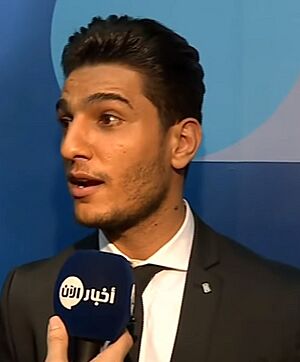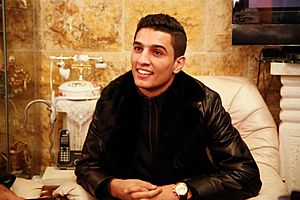Mohammed Assaf facts for kids
Quick facts for kids
Mohammed Assaf
|
|
|---|---|
| محمد عساف | |

Assaf in 2012
|
|
| Born |
Mohammed Jaber Abdul Rahman Assaf
محمد جبر عبدالرحمن عساف 1 September 1990 Misrata, Libya
|
| Nationality | Palestinian |
| Occupation |
|
| Years active | 2008–present |
| Known for | Winner of the Arab Idol |
| Spouse(s) |
Reem Ouda
(m. 2020) |
| Musical career | |
| Genres |
|
| Instruments | |
| Labels |
|
| Associated acts | |
Mohammed Jaber Abdul Rahman Assaf (Arabic: محمد جبر عبدالرحمن عساف; born September 1, 1990) is a famous Palestinian pop singer. He became well-known after winning the second season of Arab Idol, a popular TV show. His victory was celebrated around the world, especially by Palestinians and people across the Arab region.
In 2013, Assaf was chosen as a goodwill ambassador for peace by The United Nations Relief and Works Agency for Palestine Refugees (UNRWA). This means he helps promote peace and understanding. The Palestinian government also named him an ambassador of culture and arts. He was even offered a special position by Palestinian President Mahmoud Abbas.
Mohammed Assaf's inspiring journey was made into a 2015 film called The Idol. Since winning Arab Idol, he has become very popular. He has released two albums and many songs. Most of his music is sung in different Arabic dialects. His most famous song is "Ana Dammi Falastini," which means "my blood is Palestinian."
Contents
Early Life and Music Journey
Mohammed Assaf was born in Misrata, Libya. His parents were Palestinian. His mother's family came from a village called Bayt Daras. His father's family was from Beersheba. These areas were taken over in 1948, causing many people to leave their homes.
Assaf has five brothers and sisters. His family lived in Libya until he was four years old. Then, they moved to the Khan Yunis Refugee Camp in Gaza. He grew up there and went to an UNRWA elementary school. UNRWA is an organization that helps Palestinian refugees.
Mohammed's mother said he started singing at age five. She noticed he had a voice that sounded much older than his age. Before becoming famous, he studied media and public relations at Palestine University in Gaza City. He didn't have formal singing lessons. He started his career by singing at weddings and other private events.
In 2000, he gained attention on a local TV show. He called in and sang a patriotic song, which the host praised. After that, he was often offered contracts by local music companies. He even sang at an event in Gaza that the late Palestinian president Yasser Arafat attended.
Becoming an Arab Idol
Mohammed Assaf's journey to Arab Idol was quite an adventure. He traveled from the Gaza Strip to Egypt for the auditions. It took him two days to reach Egypt by car because of difficulties at the border. He had to convince Egyptian security to let him leave Gaza, where he was stuck for two days.
When he finally arrived at the hotel where auditions were held, the doors were closed. They were not accepting any more singers. So, he bravely jumped over the wall! After getting inside, he still couldn't get a number to audition. He sat in the hall, feeling hopeless, while other contestants waited.
He started singing to himself, and another Palestinian contestant, Ramadan Abu Nahel, heard him. Ramadan was so impressed that he gave Mohammed his own audition number. He told Mohammed, "I know I won't reach the finals, but you will."
His Journey on the Show
Lebanese singer and Arab Idol judge Ragheb Alama gave Mohammed the nickname Asaroukh, which means "The Rocket." The judges and the audience loved Assaf. His voice and looks reminded many people of the famous Egyptian singer Abdel Halim Hafez. Fans even combined their names, calling him Assaf Hilm Falastine ("Assaf Palestine’s Dream").
For his final performance, Assaf sang his own well-known song, "Ali al-kuffiyeh" ("Raise The Kuffiyeh"). This Palestinian song encouraged people to raise their kuffiyehs. A kuffiyeh is a traditional Arab headscarf that has become a symbol of Palestinian identity. The song called for Palestinians to unite.
Hundreds of thousands of Palestinians watched his performance. On June 22, 2013, Mohammed Assaf was announced the winner of Arab Idol. He received the most votes, beating two other finalists from Egypt and Syria. After his victory, huge celebrations took place in Palestinian cities and across the Arab world.
Audition Songs
- Casting (Cairo): "Safini Mara" by Abdel Halim Hafez
- Casting Beirut (Group audition): "Ana Elli Alayki Mishtaq" by Joseph Sakr
- Casting Beirut: "Ala Babi Waef Amarin" by Melhem Barakat
Live Show Performances
- Top 27: Ya Sghiri – Melhem Zein
- 1st Prime: Aala Hisb Oudad – Abdel Halim Hafez
- 2nd Prime: Ya Reit – Ragheb Alama
- 3rd Prime: Gatalouni Oyoun Essoud – Wadih El Safi
- 4th Prime: El Zina Labsat Khalkhalaha – Samir Yazbek
- 5th Prime: Aanabi – Karem Mahmoud
- 6th Prime: Wa Baad Kentom – Mohammed Abdu
- 7th Prime: Sawt El Heda – Assi El Helani
- 8th Prime: Kol Da Kan Leih – Mohammed Abdel Wahab and Nemshi wa Nemshi – Saber Rebaï
- Final: Ya Ain Ala Saber – Wadih El Safi, Lena Allah – Mohammed Abdu, and "Aali El Kuffiyeh" – Mohammed Assaf
Global Recognition
Mohammed Assaf became very popular across the Arab world and among Palestinians everywhere. He sang famous Arabic love songs and patriotic songs about the Palestinian cause. His performances brought joy and a sense of unity to many.
People in Gaza especially felt connected to his music. Jamal Abu Qumsan, from the Gaza Association for Culture and Arts, said Assaf's songs offered a feeling of stability. This was important during difficult times due to the Israeli-Palestinian conflict and disagreements among Palestinian groups.
Assaf even sang in English during one of the Arab Idol live shows. He performed "I Want It That Way" by the Backstreet Boys. News about him reached the United States, Europe, and Asia. Major news outlets like CNN International and The Guardian wrote articles about him.
After his win, Al Jazeera English interviewed him in Doha, Qatar. They dedicated an entire episode of their show Inside Story to his journey. They called him "the wedding singer from Gaza who was brought up in a refugee camp, to become an international star and a Palestinian hero."
In May 2023, his 2015 song "Ana Dammi Falastini" was temporarily removed from streaming platforms like Spotify and Apple Music. This caused a big reaction online. Assaf said he was told the song was removed for "inciting against Israel." However, Spotify later stated that the removal was not their decision but from the music distributor. The song was back on Spotify a few days later.
Impact and Influence
Mohammed Assaf has always said that his art and his feelings for his homeland are connected. He has spoken about the challenges faced by Palestinians in the West Bank and Gaza Strip. He also mentioned that the hunger strike of Palestinian prisoner Samer Issawi inspired him. Assaf often wore the checkered keffiyeh, a symbol of Palestinian identity, during his performances.
He is extremely popular in the Palestinian territories. When his show aired, the streets of Gaza would become empty as everyone watched. Large posters of Assaf were put up on homes and shops. He brought a sense of unity among Palestinians, which political groups had struggled to do.
Many Palestinian politicians supported him. Salam Fayyad, a former Prime Minister, asked all Palestinians to support Assaf. President Mahmoud Abbas also encouraged Palestinians worldwide to vote for him.
Before Arab Idol, Assaf had been briefly held by the security forces of Hamas more than 20 times. Hamas is a political group that controls Gaza. They tried to stop him from singing. However, Hamas did not stop Palestinians from supporting Assaf or watching the show. A Hamas member of parliament even praised Assaf, calling him the "ambassador for Palestinian art."
The Film The Idol
The Idol is a 2015 Palestinian drama film based on Mohammed Assaf's life. It was directed by Hany Abu-Assad. The film was shown at the 2015 Toronto International Film Festival.
Parts of The Idol were filmed in Gaza, which was the first time a feature film had been shot there in decades. Other parts were filmed in Jenin, Amman, Beirut, and Cairo. The film was supported by the Doha Film Institute and the Netherlands Film Fund. The Idol was chosen as Palestine's entry for the Academy Award for Best Foreign Language Film in 2017.
After Arab Idol
After winning Arab Idol, Mohammed Assaf became famous across the Arab world and among Arabs living in other countries. He has performed in many sold-out concerts. He has released several music videos. In 2014, he was invited to sing "Yalla Yalla" during the FIFA World Cup celebrations.
He has also released many songs with other artists. His 2017 hit "Baddek Enayah" featured the Cuban reggaeton group Gente de Zona. In the same year, he released "Rani," a song in both Arabic and French, with French-Algerian singer Faudel. In 2018, he worked with Lebanese-Canadian singer Massari on the song "Roll with It."
In April 2021, Mohammed Assaf took part in a "Live for Gaza" online concert. Other artists like Roger Waters, Tom Morello, and Brian Eno also participated.
Personal Life
Mohammed Assaf married Reem Ouda on August 8, 2020. Their wedding was small, with only family and a few friends attending. Reem Ouda is a Palestinian-Danish woman. She lived with her family in Saudi Arabia for some years before moving to Denmark after her father passed away.
Discography
Albums
- 2014: Assaf (Arabic: عساف)
- 2017: Ma Wahshnak (Arabic: ما وحشناك)
- 2021: Qesas min Flistin (Arabic: قصص من فلسطين)
Singles and Music Videos
- 2014: "Ya Halali Ya Mali" (Arabic: يا حلالي يا مالي)
- 2015: "Aywa Ha Ghanni" (Arabic: ايوه هغني)
- 2015: "Dammi Falastini" (Arabic: دامي فلسطين)
- 2016: "Seyouf El Ezz" (Arabic: سيوف العز)
- 2017: "Baddek Enayah" (feat. Gente de Zona) (Arabic: بدّك عناية)
- 2017: "Rani" (with Faudel)
- 2018: "Roll with It" (with Massari)
- 2019: "Kermalak Enta"
- 2020: "Shhalhalawa"
- 2020: "Dalaa Dalouna"
- 2020: "Salam Allah"
- 2020: "Filastin 'int alruwh"
- 2020: "Al Hayat"
- 2021: "Mraytak"
- 2021: "Al Hara"
- 2021: "Bahrek Gaza" (Arabic: بحرك غزة)
- 2021: "Salute to Al Quds"
- 2021: "Ya Banat Bladna" (Arabic: يا بنات بلدنا)
- 2023: "Ben Jeddah"
- 2024: "Salam Lighaza" ( سلامُ لغزة)
See also
 In Spanish: Mohammed Assaf para niños
In Spanish: Mohammed Assaf para niños
 | Aurelia Browder |
 | Nannie Helen Burroughs |
 | Michelle Alexander |


